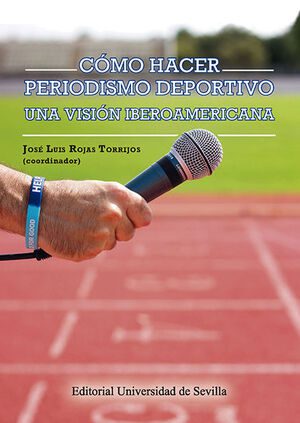Contenidos
Jose luis rojas torrijos
interview with bolivar de gracia
His main line of study is focused on sports journalism and style books, subjects on which he has written his doctoral thesis and five monographs, as well as scientific articles and book chapters. He has participated in national and international conferences and has made research stays at the universities of Urbino (Italy), Nancy (France), Oxford (United Kingdom) and Iberoamericana de Ciudad de México (Mexico).
He is also a professor of Journalism at the EUSA University Center and participates in the Masters in Innovation in Journalism at the Miguel Hernández University of Elche, Sports Communication at the Pontifical University of Salamanca, Communication and Sports Journalism organized by the European University of Madrid (UEM) and Sports Journalism at the Pompeu Fabra University (UPF) in Barcelona.
comunica2gandia
Rojas-Torrijos, José Luis;Perez-Curiel, Concepcion: Nuevos espacios para la redefinición de la profesión periodística. Pág. 67-92. Comunicación Social. Ediciones y Publicaciones. Comunicación Social. Ediciones y Publicaciones. 2020.
Rojas-Torrijos, José Luis: The Present (But Not Future) ESPN Ombudsman: Levying Accountability Through the Inception of the Digital Age. Pp. 185-199. Peter Lang Publishing. Peter Lang Publishing. 2019.
Mendez-Majuelos, María Ines;Rojas-Torrijos, José Luis;Perez-Curiel, Concepcion: Quality parameters of network journalism. Pp. 119-133. In: 1. UJI/UAB/UPF/UV. Aldea Global Collection. UJI/UAB/UAB/UPF/UV. Aldea Global Collection. 2013.
Rojas-Torrijos, José Luis: Citizen participation mailboxes in digital media: between aggregation and traditional news elaboration. The particular case of Th. Pp. 695-709. In: 1. 2011.
Rojas-Torrijos, José Luis;Ramon, Xavier: Exploring agenda diversity in European public service media sports desks. Conference communication. Future of Journalism Conference 2019. Cardiff (United Kingdom). 2019
new narratives in sports journalism (josé luis rojas)
«Lowering the idiomatic bar too much to put it at the audience’s level is nothing less than a journalistic claudication and a dereliction of professional duties», says José Luis Rojas Torrijos in this new entry in his blog.
Do journalists who use warlike language in their sports reports really encourage violence? Is violent language a valid way of attracting an audience in the sports media? What alternatives should be used instead of executioner, massacre or bomb in sports stories?
Sports journalists have a great responsibility when it comes to informing, since they are the most followed and have a great influence on the behavioral habits and modes of expression of citizens.
José Luis Rojas Torrijos, author of several books on sports journalism, calls on journalists working in the field of sports not to fall into errors of subjectivity and use of language.
análisis ocupaciones emergentes tic 2020
Este artículo exploratorio y descriptivo diagnostica el estado general de la docencia y la investigación en los programas de másteres universitarios en España. Partiendo de este planteamiento, este estudio analiza en qué medida los trabajos desarrollados en estos másteres están más orientados a la investigación o sólo se producen con fines profesionales en función de su plan de estudios y del perfil de su profesorado. Para ello, ha sido necesaria una recopilación exhaustiva de datos de las ocho universidades que han ofrecido programas de máster en periodismo deportivo entre 2017 y 2019. Así, este estudio examina el volumen, los temas y las tipologías de las tesinas que se defendieron en esos dos últimos cursos académicos. La recogida de datos se ha acompañado de cuestionarios y consultas enviadas a los profesores titulares y supervisores de estas titulaciones. Dado que todos los programas de máster en periodismo deportivo, excepto uno, son no oficiales y que un alto porcentaje de su profesorado trabaja en medios de comunicación, los resultados confirman que las tesinas apenas se centran en las teorías ni en los métodos de investigación, y los temas abordados apenas pueden abrir nuevas vías para aumentar la producción científica en este campo específico.

